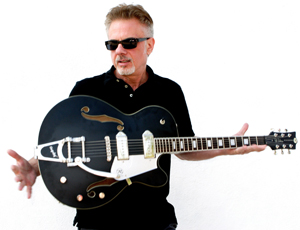Soundcraft Ghost console keeps Pete Anderson close to his roots
(Dave Molter | Posted 2010-08-16)

As one of the most successful and
influential music producers of the past 20 years, Pete Anderson has
built a career on bucking the trends of the mainstream in favor of his
own distinct and bold sound. So when the time came to outfit his new
studio in Los Angeles in 2008, Anderson sought out a mixing console
that would provide a certain level of convenience without sacrificing
an ounce of sonic integrity.
“I needed an analog board to mix on, but I didn’t want anything too
big, so I checked out the Soundcraft Ghost console,” Anderson says.
“When I first hooked up the Ghost, I played one of my recordings and
the songs sounded exactly how I wanted them to sound, right away. All
the magic I wanted just kicked in.”
From 1986 to 2003, Anderson was best known as Dwight Yoakam’s
producer, lead guitarist and music partner. Since then, Anderson has
produced albums for top country artists such as Tanya Tucker and Mark
Chesnutt, while embarking on his own solo career and starting his own
label, Little Dog Records. In all of Anderson’s work, his irreverence
for the mundane is apparent, but so too is the respect he holds for
his musical roots. This respect lies not only in the composition of
songs he produces and plays, but in the sonic elements as well.
In Anderson’s mind, the tools used to record and mix a song are as
important as the instruments used to play the songs. “I think of
myself as a sound architect, I’m looking at a certain place I want to
take a record,” he says. “With analog boards, you can push the faders
and push the EQ to get that analog distortion—the kind of sound that
made Chess recordings so memorable and Ray Charles’ voice so iconic.”
The Soundcraft Ghost has been a perfect fit for Anderson as well as
his collaborators in the studio. “The other thing that’s so great
about the Ghost is it has channels of analog strips and in the aux
section you can do all your effects,” Anderson says. “A lot of
engineers like the convenience of digital, being able to use a mouse
and all that, but they still like to mix with faders and a tangible
surface.”
Anderson recently completed production of Mark Chesnutt’s latest
release, Outlaw—a record of Chesnutt performing classics from the
“Outlaw Country” sub-genre, featuring tracks from the likes of Waylon
Jennings, Willie Nelson and Hank Williams, Jr. True to form, Outlaw
represents Anderson’s rebellious-yet-reverential approach. “The idea
wasn’t to take these songs and change them, but we did want to tighten
up the arrangements from the originals,” Anderson said.
In late 2009, Anderson released a solo album, Even Things Up, which
showcases his appreciation for—and mastery of—the blues. “For Even
Things Up, I wanted to play straight blues,” he says. “I think the
blues world is very interesting because it’s a broad umbrella—there
are no sonic boundaries. In country, there’s a ceiling for what you
can do because every act needs to be marketable. But with the blues,
you’re not planning on selling a million records and there’s a
creative freedom that goes with that. At the same time, you can find a
blues festival every day of the year and the blues will always
resonate with listeners.”
While Even Things Up represents a revisiting of Anderson’s musical
roots, the Soundcraft Ghost enables him to revisit his sonic roots as
well. “The Ghost is an unbelievable fit to add that soft edge to
digital recordings, which can sound so hard.”
For more information on Little Dog Records, please visit
www.littledogrecords.com
For more information on Pete Anderson, please visit www.peteanderson.com.
From a press release.



